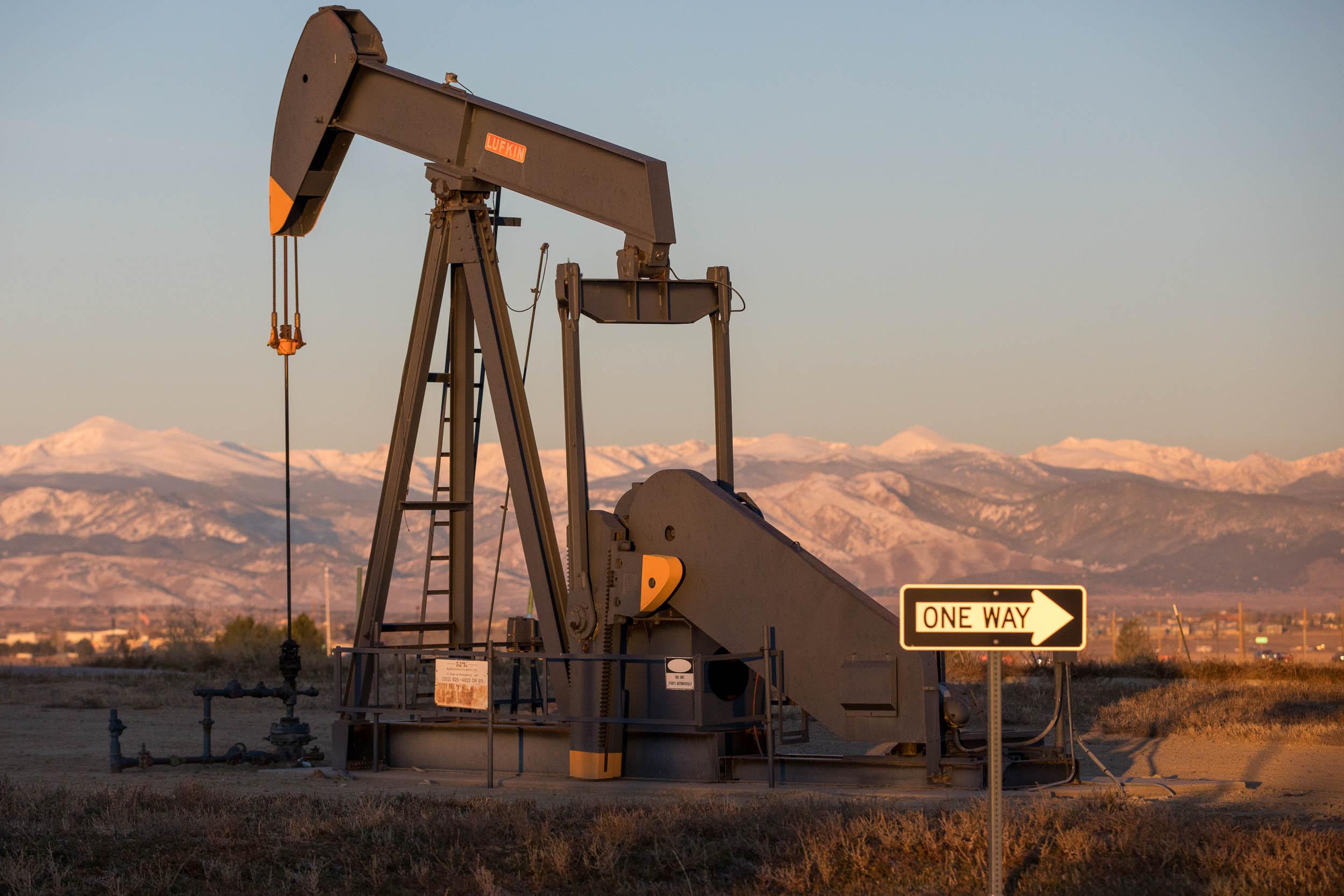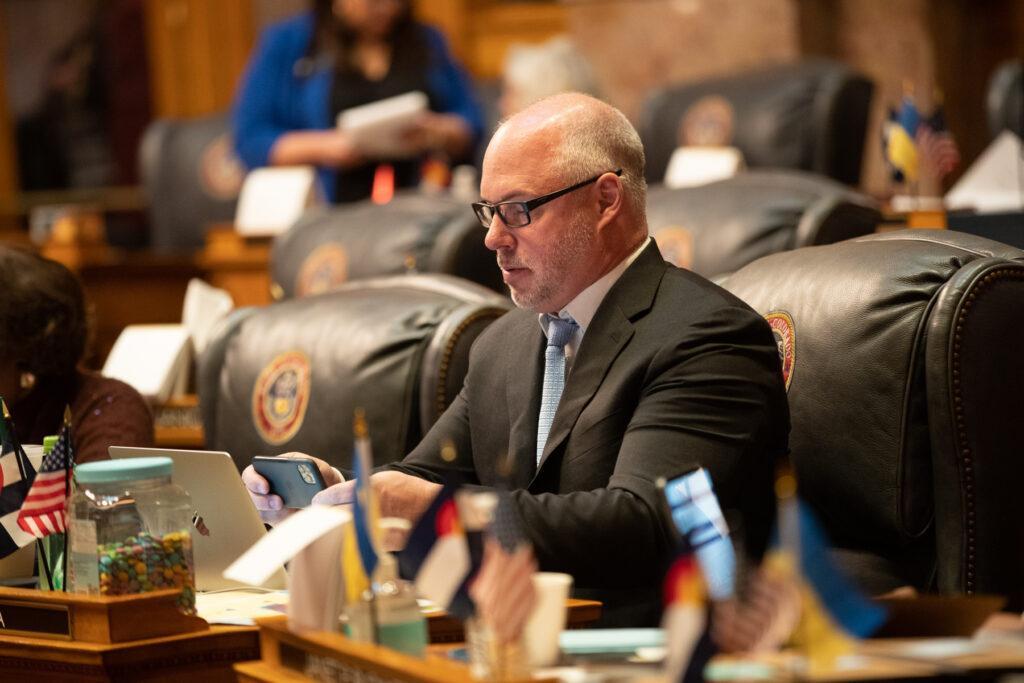
A new bill from two Colorado Democrats takes aim at one of the most difficult questions in the international debate over climate change: When, exactly, should wealthy states and countries put an end to new fossil fuel development?
Legislation introduced Tuesday would require Colorado to start the task ahead of 2030.
State Sen. Sonya Jaquez Lewis of Boulder County is sponsoring the bill along with Sen. Kevin Priola, who represents parts of Adams County and Weld County. It would require Colorado to phase out permits for new oil and gas drilling by the end of the decade, starting with any plans to expand fossil fuel extraction near low-income and minority communities.
Operators wouldn’t face any deadline to shut down current wells. The proposal, however, would ban permits to drill new sites starting in 2030, as well as any permit to redrill or deepen an existing well. If a company wins a permit between 2024 and 2030, it must start work on the project by the end of 2032, or the permit expires.

To prevent a rush of applications ahead of the 2030 deadline, state regulators couldn’t issue more than 660 permits in 2028 or 330 permits in 2029. In addition, the bill would expand liability for spent wells to any prior operator, which could help the state collect revenue to seal a growing backlog of defunct sites.
“Colorado shouldn't assume that we should be an exception to international climate agreements,” said Jaquez Lewis. “This legislation makes sure we take strong action to reduce greenhouse gas emissions by putting a definite end date on new well permits, and that will help push us in the direction of a more sustainable energy future.”
The proposal has already inflamed familiar tensions over Colorado’s oil and gas industry. A coalition of environmental groups behind the plan notes the industry is a major contributor to ground-level ozone pollution, a well-studied lung irritant that blankets the Front Range each summer. Meanwhile, representatives for the state’s top oil and gas companies warn the legislation could cost Colorado tens of thousands of jobs while increasing energy costs.
But the latest battle isn’t a straightforward replay of earlier fights, such as an unsuccessful bid from environmental groups to expand the buffer between homes and drilling sites through a 2018 ballot initiative.
After 2023 claimed the title for the hottest year on record, climate hawks in the legislature see the phase-out plan as an attempt to address concerns about global fossil fuel development, which continues to expand worldwide despite increasingly dire warnings from scientists.
The disconnect even has a name: the production gap. Last year, a United Nations panel issued a report on the problem, which found countries worldwide plan to continue extracting fossil fuels far into the future. If allowed to proceed, the analysis concluded the planet would blow past international goals to limit warming below 1.5 degrees Celsius or even 2 degrees Celsius — potentially altering the planet beyond society’s capacity to adapt.
To explain the yawning chasm, experts behind the report point to a competitive dynamic between fossil fuel producers. Even if the planet shifts to zero-carbon energy, humanity will continue to require some amount of oil, gas and coal for decades. The question is which country or corporation should to meet the demand.

Many states or countries have a reason why they should be the last to turn off the spigot. That includes Colorado, where the oil and gas industry has turned the state’s nation-leading environmental regulations into a rationale for its continued existence.
In response to the new legislation, Dan Haley, who represents mid-sized oil and gas producers as president and CEO of the Colorado Oil and Gas Association, warned a phase-out would leave consumers reliant on other producers like Saudi Arabia or Columbia.
“If this bill were to pass, it would not only crush the economy, but it would hurt the environment by relying on foreign countries with lesser environmental standards to provide the energy we need,” Haley said.
A commitment to cleaner production is no longer enough for climate advocates behind the legislation.
To hold back the worst consequences of global warming, the coalition hopes to set a precedent by proving a major fossil-fuel-producing region can lay out a plan to wind down the industry. Colorado is currently the fifth-largest oil-producing state in the U.S. and the eighth-largest natural gas producer.
Before sponsoring the legislation, Priola left the Republican Party for the Democratic Party, a move he partially blamed on the GOP’s refusal to recognize the significance of climate change. He continues to represent a region packed with oil and gas development, but said he worries about the money that leaves the state and the pollution that remains here.
"We have 50,000 wells in production right now and thousands will be producing well past 2050,” Priola said. “With the amount of oil and gas we send out of states, why do Coloradans get all the pollution while big oil and gas get the profits? We know we have to stop new drilling at some point, it can't go on forever."
Other states have approved plans to restrict future oil and gas development. New York, for example, prohibited hydraulic fracturing in 2020. California also no longer issues fracking permits, and last year its legislature passed a resolution of support for an international treaty to end the expansion of fossil fuel production around the world.
Heidi Leathwood, a climate policy analyst for 350 Colorado, said no state in the top 10 for oil and gas production has ever approved a plan to phase out permitting. She said the new legislation could set a model for other regions, which could soon face an obligation to rapidly end production as the planet continues to heat up.
“By passing this bill, we acknowledge the need for a clean transition, and we start protecting communities from all of the pollution that comes along with the energy of the past,” Leathwood said.
While the project has no shortage of ambition, it’s likely to face significant roadblocks in Colorado’s current political climate.
Gov. Jared Polis could be the biggest obstacle.
In 2019, the governor signed an overhaul of the state’s oil and gas rules, which directed state regulators to prioritize health and safety while handing more oversight to local communities. He has since opposed most proposals for further restrictions on fossil fuel development.
Jaquez Lewis said she hadn’t spoken to the governor before introducing the new legislation. A spokesperson for the governor confirmed Polis was not consulted on the bill and has not had a chance to review it.
Another snag is the potential economic fallout. The oil and gas industry quickly claimed the plan would eliminate jobs and tax revenue. In addition, trade groups warned it would lead mineral rights owners to file a massive lawsuit against the state for denying access to revenue that could be generated from their private property.
“The sponsors of this bill are doing nothing less than championing the most extreme anti-energy proposal in the history of our state, all the while ignoring the needs of everyday Coloradans who are already struggling with increasing everyday costs,” said Kait Schwartz, the director of the American Petroleum Institute Colorado.
The legislation would mandate a study on the best ways to transition oil and gas workers. It doesn’t, however, include any plans to compensate mineral rights owners or detail alternative sources of tax revenue. Jaquez Lewis said an upcoming state analysis will detail the potential impact on government budgets.
Even if the plan fails at the capitol, it could find a second life as a ballot initiative. Backers have already submitted language to put a similar 2030 permitting phase-out before voters in November.
“We can’t put all our eggs in one basket,” said Leathwood. “We think it’s really important to keep building support for the ballot initiative because, if it doesn’t pass as a bill, it would need to go directly to the people.”









